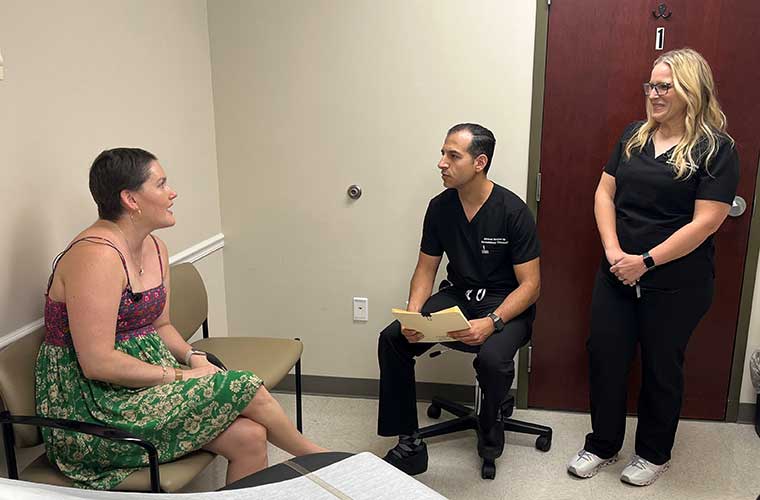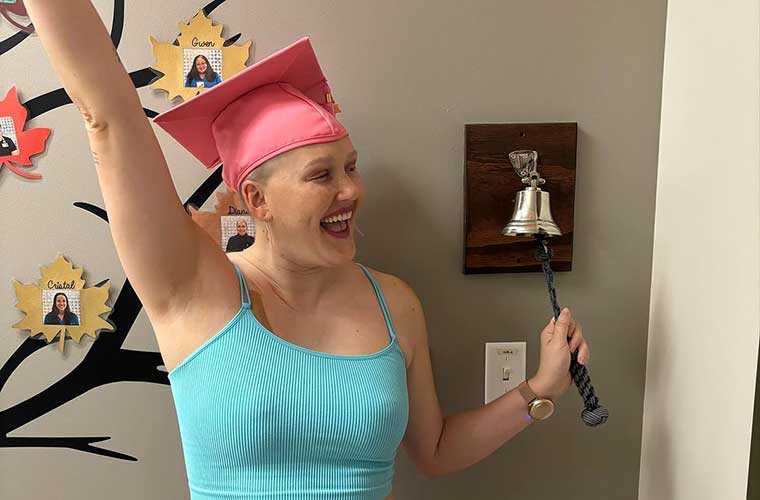Driving Home the Importance of Breast Health

Delaney Driver had just completed a workout in spring 2023 when her chest began to hurt. As she pressed her chest to find where the pain was coming from, she felt a small bead-sized lump in her left breast.
After discussing the lump with her doctor, Driver, who was 28, received an ultrasound and was told to monitor the situation for six months. In the fifth month, she said the lump grew to the size of a golf ball almost overnight. Her mother and maternal grandmother both battled breast cancer. “I always thought there was a chance that it would happen to me,” she said.
Most organizations recommend that mammography screening for the average risk woman begins at age 40. If there is family history, then they recommend that mammography screening begins 10 years earlier than the age of the family member at time of diagnosis, but not before 30. Driver’s case was an outlier and definitely required self-advocacy as well as a health care organization that recognized the needs of the patient over standard recommendations.
Driver was sent for a mammogram and biopsy at the Susan Sheppard McGillicuddy Breast Center at BayCare’s St. Anthony’s Hospital. As suspected, she was diagnosed with breast cancer.
“I honestly already knew deep down it was cancer, although no one else was thinking that way,” Driver said. “When I was diagnosed, it was the worst ‘I told you so’ moment of my life.”
When she arrived at the breast center, Driver said she felt like her concerns were being heard for the first time. “Everyone there started to listen to me – the nurse navigator, the physicians, the chemotherapy techs – everyone,” she said. “I felt like the nurse navigator was matching my energy. She was helping me because I wanted to get a plan and get things done.”
During Breast Cancer Awareness Month, Driver wants to share her story to help other patients, especially those who are younger and not in the window for mammogram screenings, to advocate for their breast health care.
“Advocating for your health by talking with your doctors and sharing your family history helps our physicians to design a treatment plan that is tailored for each individual patient.,” said Peter Blumencranz, MD, BayCare Cancer Institute medical director. “Early detection is the key to positive outcomes as well as advanced care options like those offered by BayCare.”

Finding Her Way
Driver always wanted to live in a place with good weather where she could stay active. After a friend convinced her to come to Florida for a job, she fell in love with the Tampa Bay area. She started her own business, Wilder Mind Events, in 2020 in St. Petersburg, and has planned about 200 weddings and special events.
When she discovered the lump in May 2023, one of her first thoughts was for her clients. She didn’t want to let them down but she had to take care of herself. She was able to let her events team handle many of the on-site activities while she continued to plan the events.
That was a good thing for her to do, said Ahmad Shaker, MD, a BayCare Medical Group oncologist on the St. Anthony’s campus, who worked with Driver on her plan of care. “She has done very well throughout her treatment,” Dr. Shaker said. “It helps to have a patient who is willing to participate and take care of herself and follow the treatment protocol extensively.”
Driver said her mother was 49 when she was diagnosed while her grandmother was about 40. “They both just had surgery and it was over,” she said. “But for me, there was an extensive treatment plan.” Her treatment started with 16 weeks of chemotherapy.
“Typically for higher stages of breast cancer – she was determined to be at Stage 3 – we start with what’s known as a neoadjuvant chemotherapy approach, which means we give chemotherapy before surgery,” Dr. Shaker said.
Driver then underwent a double mastectomy on June 17, removing her right breast as a precautionary measure.
“Now she is receiving radiation therapy,” Dr. Shaker said. “She’ll also receive an endocrine therapy (for) a prolonged period of (up to) 10 years. At the same time, we continue what’s known as surveillance, which is a very critical part of the treatment.”
Treatment options have changed since her mother and grandmother had the disease. And though Driver had a family history of breast cancer, the disease was not genetic in nature, Dr. Shaker said. “I think we should be focusing more on the patients who are at higher risk because individualized treatment is really what’s necessary,” he said.

Advocating for Life
More younger patients like Driver are being diagnosed with breast cancer. “There has been an increase in the incidence of breast cancer especially in younger females,” Dr. Shaker said. “According to recent studies from the American College of Radiology and the Canadian Association of Radiologists, there has been an increase of 46% in the incidence of breast cancer in patients in their 20s.”
Dr. Shaker suggests to his patients that they eat healthier, exercise and see their doctor. “I think the most important thing about Breast Cancer Awareness Month is what it says in the name – awareness. … Don’t be afraid to be aware of your breast, the way it looks, the way it feels,” he said. “And if you feel something that looks odd or abnormal or doesn’t make sense, reach out to your primary care physician. The strong recommendation is for every female at the age of 25 to undergo a risk assessment (that) looks at your diet and family history.”
With her cancer in remission, Driver is glad that she’s having those conversations now. She’s excited to be able to exercise again – she had to take some time away while recovering from surgery. And another thing that has helped her is sharing her story on Instagram @GivingItMyBreast.
“So many people have reached out, especially younger women, because they identify with my story,” she said. “I wanted to share what comes with a diagnosis like this and how to stay positive throughout this journey. You must advocate for yourself. I’m glad that I did.”
BayCare Cancer Care
With 16 hospitals, more than 20 imaging centers and hundreds of facilities, BayCare offers cancer care where patients need it. From diagnosis to treatment to recovery and beyond, BayCare is there to offer advanced and compassion care. BayCare recently broke ground on a $33 million proton therapy system that will be located in St. Joseph’s Hospital’s Fred J. Woods Radiation Therapy Center. The system at St. Joseph’s will be an advancement to optimize cancer treatment services across all of BayCare, including the other accredited radiation oncology programs at Morton Plant Hospital in Clearwater, St. Anthony’s Hospital in St. Petersburg and Winter Haven Hospital in Winter Haven. For more information on BayCare’s cancer care, visit BayCareCancer.org.
